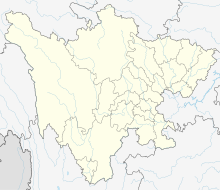Yibin Wuliangye Airport
 From Wikipedia - Reading time: 8 min
From Wikipedia - Reading time: 8 min
Yibin Wuliangye Airport 宜宾五粮液机场 | |||||||||||
|---|---|---|---|---|---|---|---|---|---|---|---|
| Summary | |||||||||||
| Airport type | Public/military | ||||||||||
| Serves | Yibin, Sichuan, China | ||||||||||
| Location | Zongchang, Cuiping District | ||||||||||
| Opened | 5 December 2019 | ||||||||||
| Elevation AMSL | 420 m / 1,378 ft | ||||||||||
| Coordinates | 28°51′29″N 104°31′30″E / 28.858°N 104.525°E | ||||||||||
| Map | |||||||||||
 | |||||||||||
| Runways | |||||||||||
| |||||||||||
| Yibin Wuliangye Airport | |||||||
|---|---|---|---|---|---|---|---|
| Simplified Chinese | 宜宾五粮液机场 | ||||||
| Traditional Chinese | 宜賓五糧液機場 | ||||||
| |||||||
Yibin Wuliangye Airport (IATA: YBP, ICAO: ZUYB) is a dual-use public and military airport serving the city of Yibin in southern Sichuan province, China. Opened in December 2019, it replaced the older Yibin Caiba Airport. The airport is named after Wuliangye, a locally made liquor that is one of the most famous baijiu brands in China.[1]
Overview
[edit]The airport received approval from the State Council of China in May 2012. It occupies an area of 4,500 mu (300 ha) in Zongchang Town (宗场), Cuiping District, 11 kilometres (6.8 mi) northwest of the city center.[2] Construction began in October 2016 with a total investment of 2.927 billion yuan, and the airport opened on 5 December 2019.[3] It replaced the older Yibin Caiba Airport.[2]
Facilities
[edit]The airport has a runway that is 2,600 metres (8,500 ft) long and 45 metres (148 ft) wide (class 4C), a 24,000-square-metre (260,000 sq ft) terminal building, and 13 aircraft parking aprons. It is projected to handle 2.5 million passengers annually by 2024.[3]
Airlines and destinations
[edit]Naming
[edit]The airport is named after Wuliangye, a famous liquor made in Yibin. This choice of name caused controversy in China. The name has been a target of ridicule by the public[17] and is considered illegal by some legal experts.[1] Although Renhuai Maotai Airport, another airport under construction in nearby Guizhou Province, is also named after the famous liquor brand Maotai, it has not attracted as much criticism as Maotai itself is named after a town.[17] Responding to the controversy, the Wuliangye Company has declared that it has not paid to have the airport named after its brand.[18]
See also
[edit]- List of airports in China
- List of the busiest airports in China
- Huawei station, metro station which also attracted attention for being named after a company
References
[edit]- ^ a b 宜宾机场更名被指违规 (in Chinese). Dongfang Daily. 25 May 2012. Retrieved 14 July 2012.
- ^ a b 国务院正式批复宜宾五粮液机场迁建项目立项 (in Chinese). Carnoc. 23 May 2012. Retrieved 14 July 2012.
- ^ a b Yao Xiaolan 姚晓岚 (2019-12-05). "宜宾五粮液机场今日通航:预计明后年通航城市将达到40个". The Paper. Retrieved 2019-12-08.
- ^ "关于北京航与国航共用航班的公告". Retrieved 23 November 2023.
- ^ "冬春航季今启航 | 成都航空32条新航线陆续首航,150元新疆区域"无限飞"!". Retrieved 30 November 2023.
- ^ "新航季 | 成都航空夏秋航季全新开启". Retrieved 18 June 2024.
- ^ a b c d e "春运来了!宜宾五粮液机场开通这些新航线!". Retrieved 26 February 2024.
- ^ "【新航季来啦~】点击查收南航四川冬春航季运行时刻".
- ^ "今日起,石家庄机场迎来夏航季!航班时刻表→". Retrieved 25 April 2023.
- ^ a b "【首发头条】南宁机场2022年冬航季换季特别资讯". Retrieved February 4, 2023.
- ^ "注意!晋江国际机场已执行民航2023年冬航季航班计划!". Retrieved 9 December 2023.
- ^ a b "盐城机场3月31日起执行夏秋时刻". Retrieved 15 August 2024.
- ^ "Sichuan Airlines / Chengdu Airlines NW22 Domestic Network Additions". Aeroroutes. Retrieved 8 November 2022.
- ^ a b "2023年新航季川航最新航线出炉,附国际/地区航线新消息". Retrieved 16 March 2023.
- ^ "【航班恢复】6月14日起,宜宾=上海恢复至每天两班,带您感受魔都魅力". Retrieved 19 September 2024.
- ^ "徐州机场2023年冬航季航班时刻表". Retrieved 12 November 2023.
- ^ a b “五粮液”命名机场不孤单 “茅台”机场将比邻而居 (in Chinese). Yicai Daily. 25 May 2012. Retrieved 14 July 2012.
- ^ 五粮液: 我们没出赞助费 (in Chinese). Beijing Morning Post. 10 June 2012. Retrieved 14 July 2012.
 KSF
KSF